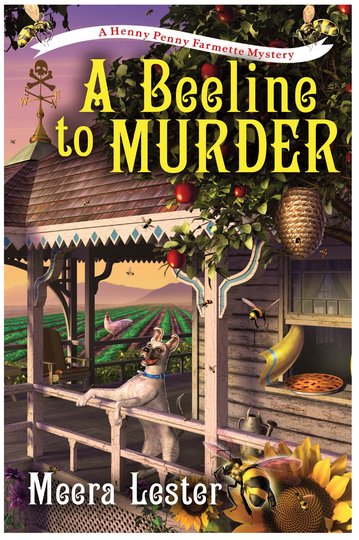The Murder of a Queen Bee (29 page)
Read The Murder of a Queen Bee Online
Authors: Meera Lester

“Ohhh, Jesus, Mary, and Joseph! The birds and the bees, you say? Now you've got my attention.” He turned in his seat and played with a tendril of hair behind her ear. “Oh, Abby,” he said in a breathy voice. “I'd love to share with you what I know about that.”
Abby smiled wickedly. “I thought you might.”
Lemon Ice Cream with Strawberries
Ingredients:
1 cup superfine sugar
¼ cup fresh lemon juice
1 tablespoon lemon zest
1 cup heavy cream
1 cup whole milk
 teaspoon salt
teaspoon salt
1 cup fresh sliced strawberries
¼ cup fresh lemon juice
1 tablespoon lemon zest
1 cup heavy cream
1 cup whole milk
 teaspoon salt
teaspoon salt1 cup fresh sliced strawberries
Â
Directions:
Combine the sugar, lemon juice, and lemon zest in a large bowl.
Slowly pour the cream, milk, and salt into the lemon-sugar mixture and stir constantly until the sugar is completely dissolved, about 2 minutes.
Pour the lemon-cream mixture into freezable individual molds or bowls or into an ice cube tray, and then cover with foil and freeze until the ice cream is completely firm, about 3 to 5 hours, depending on the type of mold used.
Unmold the ice cream, garnish each serving with the sliced strawberries, and serve at once.
Serves 4
Acknowledgments
M
y heartfelt gratitude goes to Aaron Pomeroy for your encyclopedic mind and insight into law enforcement. Whenever I have a cop question, you've got the cop answer. Please know I deeply appreciate your help, and if, inadvertently, I have made any mistakes, they are all mine.
y heartfelt gratitude goes to Aaron Pomeroy for your encyclopedic mind and insight into law enforcement. Whenever I have a cop question, you've got the cop answer. Please know I deeply appreciate your help, and if, inadvertently, I have made any mistakes, they are all mine.
Thanks also to Heather Pomeroy for the ongoing support and enthusiasm for my Henny Penny Farmette cozy mysteries. Your paramedic background and also your experience as an evidence technician in a small-town police department have proven invaluable to me.
I also want to thank Madison and Savannah for all their questions, feedback, and ideas. There's always something new to learn from you two.
Books and magazines about beekeeping line my bookshelves, but for fast answers to my questions about bees, I know I can rely on Botros (Peter) Kemel and Wajiha (Jill) Nasrallah. You have taught me most of what I know about keeping bees and harvesting honey. Together, you have a wealth of knowledge and generously share it. Thanks to you both.
For her unwavering support of the Henny Penny Farmette, I offer my thanks to Jeanne Lederer. The element of setting in a story can serve many purposes: it can be a place of sanctuary and safety or of fear and uncertainty. Your mid-century stone house in the woods serves as a scary counterpart to the sheltered farmette of my protagonist, permitting me to generate fictional threads of rising tension from that wooded acre.
To my architect husband, Carlos J. Carvajal, who teaches me what I don't know about renovation and has patiently answered all my remodeling questions in connection with this story, I offer my heartfelt appreciation. My son Josh deserves my thanks for untold hours helping me build and maintain my Web sites. Also, Josh and Carlos, you both have earned huge hugs of appreciation for a willingness to be first-level taste testers for all my recipe creations and modifications.
For her continuing belief in me, I offer thanks, along with a huge hug and a kiss, to my agent, Paula Munier. I've been honored to have you as a lifelong friend and fellow author. Your dazzling mind and astonishing talent never cease to amaze me.
I offer my deepest appreciation to my brilliant editor Michaela Hamilton, whose insights are spot on and whose guidance is always so welcome.
Finally, I want to thank all the folks at Kensington Publishing for their knowledge, expertise, and support of my Henny Penny Farmette mysteries.
ABOUT THE AUTHOR

Photo by Carlos J. Carvajal
Meera Lester
is the author of of the first Henny Penny mystery,
A Beeline to Murder,
and nearly two dozen nonfiction books. She is the proprietress of the real Henny Penny Farmette, located in the San Francisco Bay Area. While raising chickens and honeybees, she draws on her life with her animals and gardens as the basis of her Henny Penny Farmette mysteries. She blogs about life there at hennypennyfarmette.com. You can also visit her at meera lester.com/mlls, facebook.com/meera.lester, and twitter. com/MeeraLester.
is the author of of the first Henny Penny mystery,
A Beeline to Murder,
and nearly two dozen nonfiction books. She is the proprietress of the real Henny Penny Farmette, located in the San Francisco Bay Area. While raising chickens and honeybees, she draws on her life with her animals and gardens as the basis of her Henny Penny Farmette mysteries. She blogs about life there at hennypennyfarmette.com. You can also visit her at meera lester.com/mlls, facebook.com/meera.lester, and twitter. com/MeeraLester.

Notes
1
Pasteurized eggs may be substituted for the organic eggs if there is a concern about the risk of bacteria in raw eggs.
Other books
Embers (The Wings of War Book 1) by Karen Ann Hopkins
Illegal Liaisons by Grazyna Plebanek
Christian Bale by Harrison Cheung
Certainty by Madeleine Thien
Death Drop by Sean Allen
Unlike a Virgin by Lucy-Anne Holmes
Waiting for Robert Capa by Susana Fortes
When Is a Man by Aaron Shepard
Lines We Forget by J.E. Warren
Kiss the Morning Star by Elissa Janine Hoole